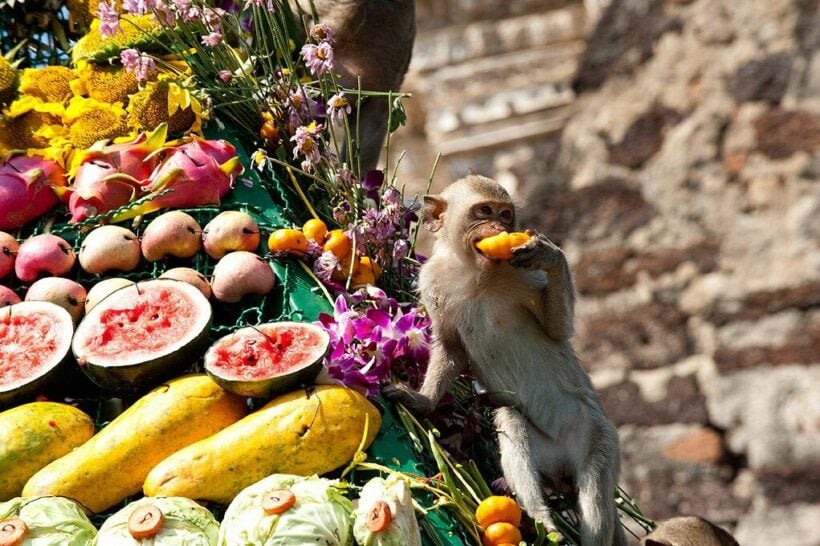Thailand’s monkey feast festival in Lopburi attracts raucous crowd

Thailand’s monkey feast festival in Lopburi is definitely not to everyone’s taste but it certainly attracts a raucous crowd.
A banquet fit for the Monkey King was laid before Lopburi’s massed monkeys on Sunday – the last in November – at the annual simian celebration in central Thailand.

Lopburi is one of the oldest cities in Thailand, home to King Narai’s Palace and Wat Phra Sri Rattana Mahathat. A visit to Lopburi is often a good way to get off the usual tourist trail of Thai cities.
Some 4,500 crab-eating macaques roam the streets around the crumbling Khmer-style Phra Prang Sam Yod — monkey temple — in the city centre. Today the macaques throng around the temple, boisterous, and at times fighting with each other, but there is a feeling of restraint before the battle of the buffet begins.
As the carefully prepared feast is brought to the temple, they begin to pounce and are soon gobbling up the largely vegetarian spread like… well, like monkeys at a feast.

Yongyuth Kitwatanusont, the festival’s founder, explained what was behind the slap-up meal…
“This monkey feast festival helps promote Lopburi’s tourism among international tourists every year.
“Previously, there were around 300 monkeys in Lopburi before increasing to nearly 4,000 nowadays. Lopburi is known as a monkey city, which means monkeys and people can live in harmony.”
Harmony? Maybe. Peace and harmony? Definitely not. The disorderly crowd assail and assault visitors, occupying vehicles, lampposts and anywhere else that a monkey can hang. While the monkeys themselves are clean and well-groomed for the occasion, they have, today at least, very little regard for their environment and the mess is enormous.
This year’s event is quieter than previous years, and the crowd is largely Thai. Pre-covid, monkey participation had decreased due to high numbers of tourists, which put them off their dinner.

“There was a monkey on my back as I was trying to take a selfie. He grabbed the sunglasses right off my face and ran off onto the top of a lamppost and was trying to eat them for a while,” said Stewart Diamond, a tourist visiting Thailand’s monkey feast festival from Hartlepool in Great Britain.
The risk of petty theft – or pretty serious theft considering the number of iPhones and designer sunglasses on display – is considerable. But telling the tale of how “the monkey stole my camera” at the office next week seems to be enough to compensate the few who lose stuff. Generally, monkeys can be bribed to return their swag, but today they are not looking for food, so thefts are limited.
The festival is an annual tradition in Lopburi, the provincial capital, and is a way to show gratitude to the monkeys for bringing in tourists.

Latest Thailand News
Follow The Thaiger on Google News:


























